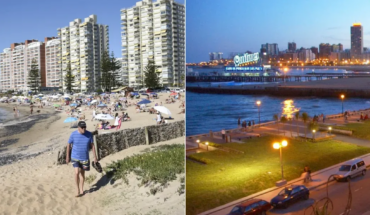speaks of the “economic damage” that has caused the lack of coastline and makes millionaires calculations about how much money could enter the country, if you have a “sovereign port”.
On Monday, the International Court of Justice in the Hague, Netherlands, issued a ruling on whether Chile should or not to negotiate the exit to the Pacific Ocean, which calls its neighbor, which filed a petition with the Court in 2013.
His aspiration is to put an end to the “puerto-dependencia” of Chile, considering that 75% of its load uses the facilities of the neighbouring country.
Chile, on the other hand, argues that the Bolivian cargo enjoys preferential conditions in Chilean ports, because thus establishes it a Treaty of 1904 signed by the parties that, in addition to secure borders, incorporated the requirement of the “free movement” of shipments in the neighboring country.
The “economic disadvantage” for Bolivia Bolivian authorities and entrepreneurs is that their country’s economic development has been affected by having to use the Chilean ports of Arica, Antofagasta and Iquique.
“Every year the country loses the possibility of its gross domestic product to grow between 1% and 3%”, said Gary Rodríguez, an economist and general manager of the Bolivian Institute of foreign commerce (IBCE), in conversation with BBC world.
That would mean, according to the calculations of the Organization, an economic loss of between US$ 400 and US$ 1,000 billion per year.
The various sources consulted by BBC World make calculations of the same order. But how they arrive at that figure?
“Bolivia must incur cost overruns logistics to make use of Chilean ports,” says Rodriguez.
Costs relating to the transfer of freight, storage, insurance committed, vehicles stay or consumption at the place, he argues.
That he should add, says Rodriguez, the damages not be able to use Chilean ports in more than 60 days of stoppages in the past five years, representing a cumulative loss of $300 million.
“If Bolivia a sovereign outlet to the sea and a sovereign port, not would face such problems,” added Rodriguez.
Something similar is Ronald Nostas, President of the Confederation of private businessmen of Bolivia (CEPB), who estimated that the country loses US$ 1,000 billion dollars a year and 2% of GDP for not having a sovereign exit to the sea.
“The barriers imposed by the landlocked to Bolivia are multiple, affect competitiveness and generate the cost of transporting our products are fundamentally beyond 30%.”
The business leader, who participated in the Bolivian delegation that presented the allegations before the Court, said that Bolivia is subject to “abuse, internal conflicts and the bureaucracy of the administration of Chilean ports”.
What they say in Chile about the economic claim?
“Chile does not know how to make that calculation of economic prejudice to 2% of GDP”, he says to BBC World Astrid Espaliat, Professor of the Institute of international studies of the University of Chile.
“Get the goods and transfer them to another place in the world has a certain cost. “That cost does not change, not be how can vary that depending on having sovereignty or not having sovereignty”, adds.
A 1904 Treaty established the right to “freedom of movement” of the Bolivian goods by Chilean ports.
“They perhaps are imagining that they would have their own ports and that then they should not incur the costs of moving merchandise. But that is not the case,”says.
According to a document from the Chilean Foreign Ministry, Santiago does not impose “taxes, duties or taxes to the Bolivian cargo in transit to or from Bolivia”.
“Bolivian load enjoys the same rights that charge Chilean and with more advantages, including free storage which do not enjoy the Chilean goods or of third countries,” the statement added.
According to Sergio Giaconi, Manager general of the Corporation for development of Arica and Parinacota, ‘Bolivia pays only the rates of transfer of cargo in the port, which are international rates’.
“The Chilean, Bolivian or Peruvian goods passing through the port of Arica pays the same rate by transfer load. There is no difference”, it tells you to BBC World Giaconi.
The difference is that “they have benefits that we do not have, such as storage free load for one year”, says.
A little-known aspect is that there are customs agencies of the Bolivian Government operating in Chilean ports.
“Bolivian cargo has to pay its own customs agencies operating in Chilean ports,” explains Giaconi.
Sources of the Ministry of foreign relations of Chile told BBC Mundo that the country has invested about $834 million in recent years to meet the free transit of Bolivian cargo in Chile, including the construction of infrastructure works made in the port of Arica, in Antofagasta and railroad Arica – La Paz.
The estimate is that Chile assumes an annual cost close to US$ 100 millonesal year the free transit of Bolivian products will be fulfilled.
And that you should add investment in maintenance of roads and railways so that transit the Bolivian trucks to the ports.
“Chile complies with all obligations of the free movement and that has a high annual cost for Chile,” says a BBC World Paulina nonstructural, Professor of the Faculty of Ciencias Jurídicas y Sociales of the Universidad de Concepción, in the South of Chile.
But how it would affect Chile a sovereign exit to the sea of Bolivia?
As the Government of Chile does not consider that there are legal grounds to discuss the border, nor makes projections about how affect you economically cede territory.
Arica is the most widely used by Bolivian charge Chilean port.
Analysts consulted by BBC World also wanted to make predictions about that scenario, because to make them, “would have to have at least one possible map of what would be the territory that Bolivia is claiming, and that now does not exist in the discussion”, designates one of the experts consulted.
“They talk of access to sovereignty, but are not demanding a specific amount of kilometres of coastline.”
“Not everything is because of its sovereign access to the sea” in dialogue with BBC World, Franklin partner, Bolivian political scientist and Professor at the Universidad Mayor de San Andrés, said that Bolivia has “a perverse dependence of Chilean ports”.
And he agrees that its sovereign access to the sea would boost economic growth in Bolivia.
However, it warns that the lack of competitiveness of the Bolivian products is explained by structural problems in its economy.
“Not everything is because of its sovereign access to the sea. Bolivia needs to diversify its production and move beyond the extractive model exporter”.
But it is necessary to recognize, says the analyst, that having to use Chilean ports, the Bolivian products become less competitive in international markets.
Strikes in Chilean ports have affected the Bolivian goods.
On the other hand, there are constant strikes in those ports that affect the Bolivian loads and that damage to the country’s economy, although “there is no accurate calculation enabling you to quantify precisely how much is what loses Bolivia for not having sovereign access to the sea”.
With the ruling of the International Court of Justice, a new chapter will be written in this dispute that dates back to 1879, when Bolivia lost to Chilean troops about 400 kilometers of coastline and about 120,000 square kilometers of territory in the war of the Pacific.
What says the Court will have historical and political implications that keep expectant to the inhabitants of the two South American Nations.





